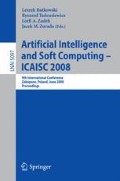Abstract
In this paper we propose and analyse a γ-margin generalisation of the perceptron learning algorithm of Rosenblatt. The difference between the original approach and the γ-margin approach is only in the update step. We consider the behaviour of such a modified algorithm in both separable and non-separable case and also when the γ-margin is negative. We give the convergence proof of such a modified algorithm, similar to the classical proof by Novikoff. Moreover we show how to change the margin of the update step in the progress of the algorithm to obtain the maximal possible margin of separation. In application part, we show the connection of the maximal margin of separation with SVM methods.
Access this chapter
Tax calculation will be finalised at checkout
Purchases are for personal use only
Preview
Unable to display preview. Download preview PDF.
References
Burgers, J.C.: A tutorial on support vector machines for pattern recognition. Data Mining and Knowledge Discowery 2, 121–167 (1998)
Collobert, R., Bengio, S.: Links between perceptrons, mlps and svms. In: Proc. of the 21st International Conference on Machine Learning, Banff, Canada (2004)
Blake, C.L., Newman, D.J., Hettich, S., Merz, C.J.: UCI repository of machine learning databases (1998)
Freund, Y., Schapire, R.E.: Large margin classification using the perceptron algorithm. Machine Learning 37(3), 277–296 (1999)
Joachims, T.: Training linear SVMs in linear time. In: KDD 2006, Pennsylvania, USA (2006)
Klęsk, P., Korzeń, M.: Perceptron algorithm: notes on statistically expected convergence. Polish Journal of Environmental Studies 15(4C) (2006)
Kowalczyk, A., Smola, A.J., Wiliamson, R.C.: Kernel machines and boolean functions. Advances in Neural Information Processing Systems 14 (2002)
Li, Y., Long, P.M.: The relaxed online maximum margin algorithm. Machine Learning 46(1-3), 361–378 (2002)
Novikoff, A.B.J.: On convergence proofs on perceptrons. In: Proceedings of the Symposium on the Mathematical Theory of Automata, Polytechnic Institute of Brooklyn, vol. XII, pp. 615–622 (1962)
Rosenblatt, F.: Principles of neurodynamics: Perceptron and theory of brain mechanisms. Spartan Books, Washington D.C (1962)
Vapnik, V.N.: The Nature of Statistical Learning Theory. In: Statistics for Engineering and Information Science. Springer, New York (2000)
Author information
Authors and Affiliations
Editor information
Rights and permissions
Copyright information
© 2008 Springer-Verlag Berlin Heidelberg
About this paper
Cite this paper
Korzeń, M., Klęsk, P. (2008). Maximal Margin Estimation with Perceptron-Like Algorithm. In: Rutkowski, L., Tadeusiewicz, R., Zadeh, L.A., Zurada, J.M. (eds) Artificial Intelligence and Soft Computing – ICAISC 2008. ICAISC 2008. Lecture Notes in Computer Science(), vol 5097. Springer, Berlin, Heidelberg. https://doi.org/10.1007/978-3-540-69731-2_58
Download citation
DOI: https://doi.org/10.1007/978-3-540-69731-2_58
Publisher Name: Springer, Berlin, Heidelberg
Print ISBN: 978-3-540-69572-1
Online ISBN: 978-3-540-69731-2
eBook Packages: Computer ScienceComputer Science (R0)

